5+ Risks to Consider Before You Build Your Own AI Partner
Understand the dangers and challenges before you build your own AI partner. Learn about the risks of using AI in our insightful blog post.

As more people turn to AI for emotional support and social interaction, it’s vital to understand the key risks before you build your own AI partner. While these systems are appealing, they come with potential risks tied to AI development, including privacy violations, emotional dependency, and algorithmic bias. Navigating these risks, including data privacy breaches, malicious use, and potential ethical concerns, is crucial when creating an AI system.
At Kindroid, we prioritize risk management while developing customizable, human-like AI companions that go beyond chatbots. Through advanced machine learning, we offer highly realistic interactions, allowing users to personalize every aspect, from personality to voice. We ensure that AI safety and user freedom remain our top priorities, safeguarding sensitive information from potential threats.
Based on extensive research, we’ve put together this guide to explore the risks involved when you build your own AI partner. By the end, you will understand the critical role of human judgment in ensuring safe AI development.
Let's dive in!
7 Risks to Consider Before You Build Your Own AI Partner
As more people turn to artificial intelligence for companionship, it's essential to understand the potential risks before you build your own AI partner. While creating a custom AI offers exciting possibilities, it also comes with challenges. Here are seven key risks to consider before you build your AI.
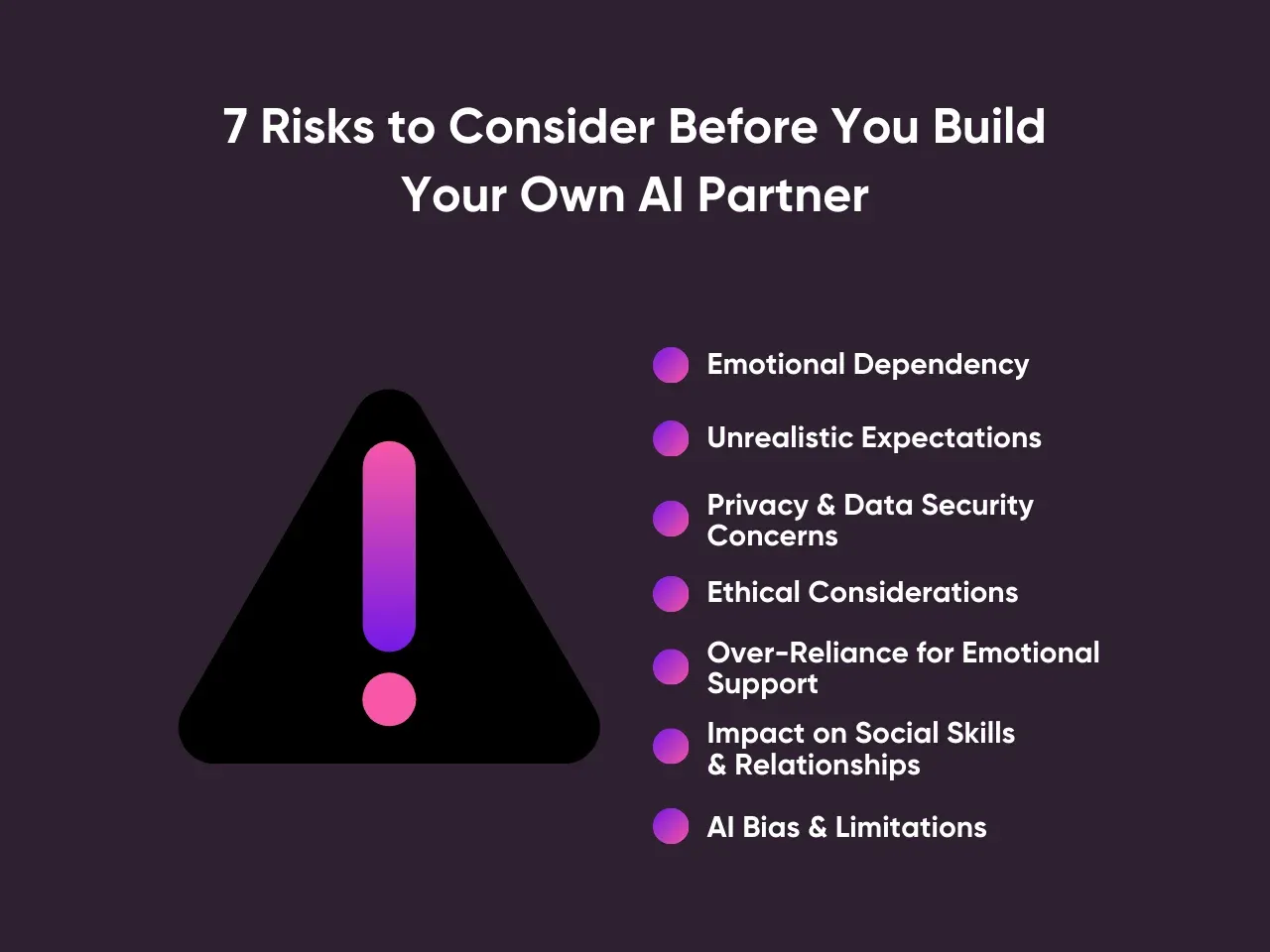
Risk 1: Emotional Dependency
Emotional dependency on an AI companion presents a clear danger to human relationships. When individuals build your own AI, attachments may form that could weaken their social skills and emotional connections. Although generative AI can mimic human interaction using deep learning, it lacks true human intelligence, which may blur the lines between reality and AI. This can lead to neglecting real-life connections, ultimately affecting mental health and social trust.
To maintain a balance between AI and real-world connections, consider these strategies:
- Set boundaries for interaction time to avoid over-reliance.
- Prioritize real-life relationships over virtual ones.
- Engage in activities that develop social skills and emotional resilience.
- Be aware of the negative impacts AI can have on personal well-being.
- Ensure human intervention in AI-based interactions to maintain reality.
Without these precautions, emotional dependence could lead to more harmful outcomes, such as job displacement, increased job loss, and weakened social ties. The lack of transparency in AI algorithms and the potential for social manipulation underscore the importance of applying a comprehensive risk management framework for AI use.
Risk 2: Unrealistic Expectations
When you build your own AI, users may develop unrealistic expectations about their AI companion’s abilities. They might expect advanced emotional responses or complex problem-solving, leading to potential disappointment. Understanding the limitations is crucial for satisfaction. Common unrealistic expectations include:
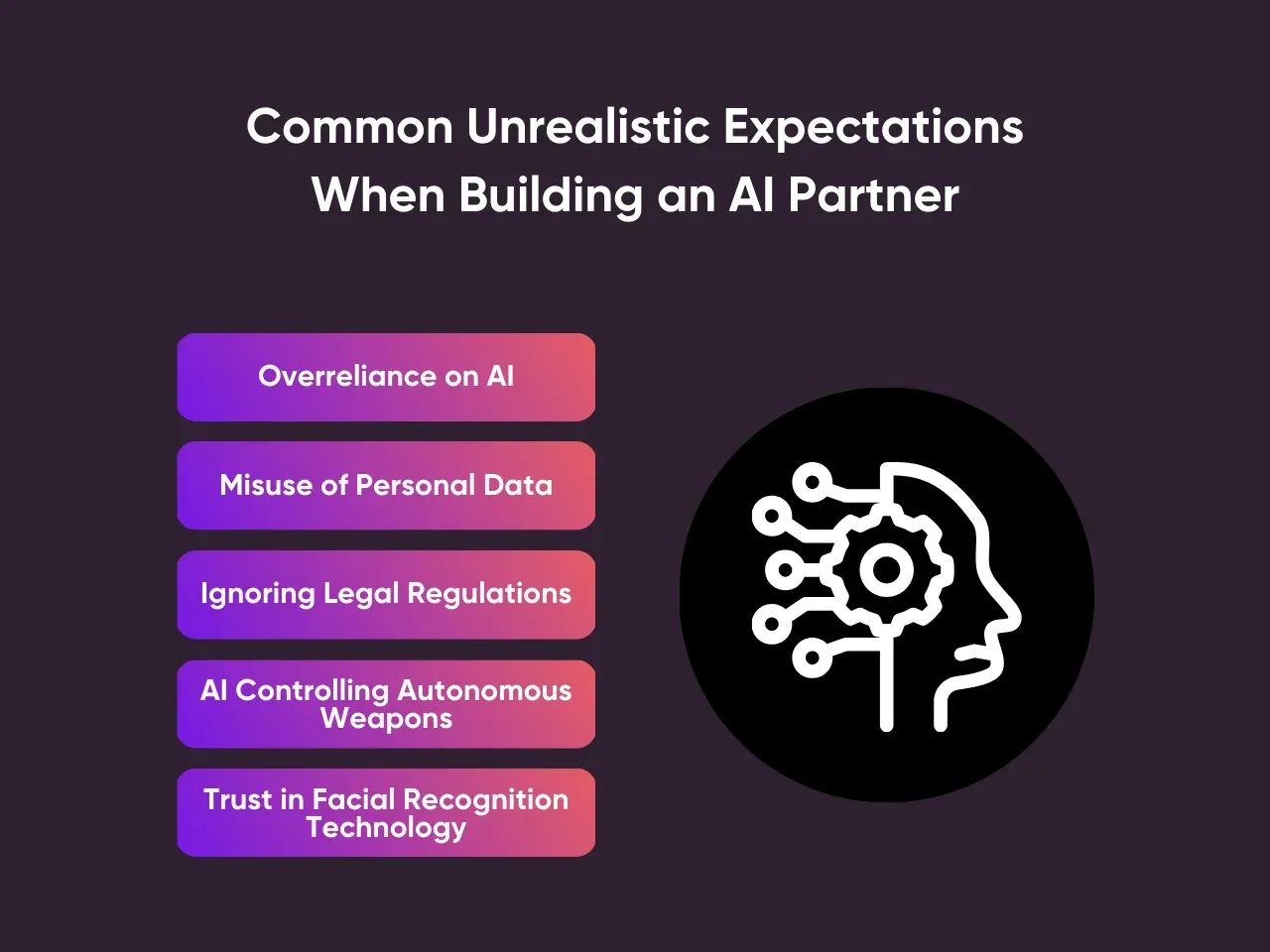
- Overreliance on AI: Assuming AI can replace human relationships.
- Misuse of Personal Data: Expecting complete privacy when inputting sensitive information.
- Ignoring Legal Regulations: Assuming AI operates outside laws like intellectual property rights.
- AI Controlling Autonomous Weapons: Believing science fiction scenarios about AI's ability to develop these technologies.
- Trust in Facial Recognition Technology: Relying on AI for complete accuracy in identifying individuals.
It’s essential to set clear boundaries when you build your own AI. Recognizing the dangers of AI, such as misuse in areas like fake news and autonomous weapons, will help users manage their expectations. Proactive measures, such as understanding technological advancements, are necessary to ensure AI is used ethically and effectively.
Risk 3: Privacy and Data Security Concerns
When you build your own AI, safeguarding personal information is crucial. The AI will process and store sensitive data, which requires strict privacy measures. Users must be cautious about the data they share, as interactions can potentially expose personal details.
The risks of building your AI include data breaches and misuse of information. Protecting user data is a top priority. Several best practices can help minimize these risks. Here are five ways to secure data effectively:
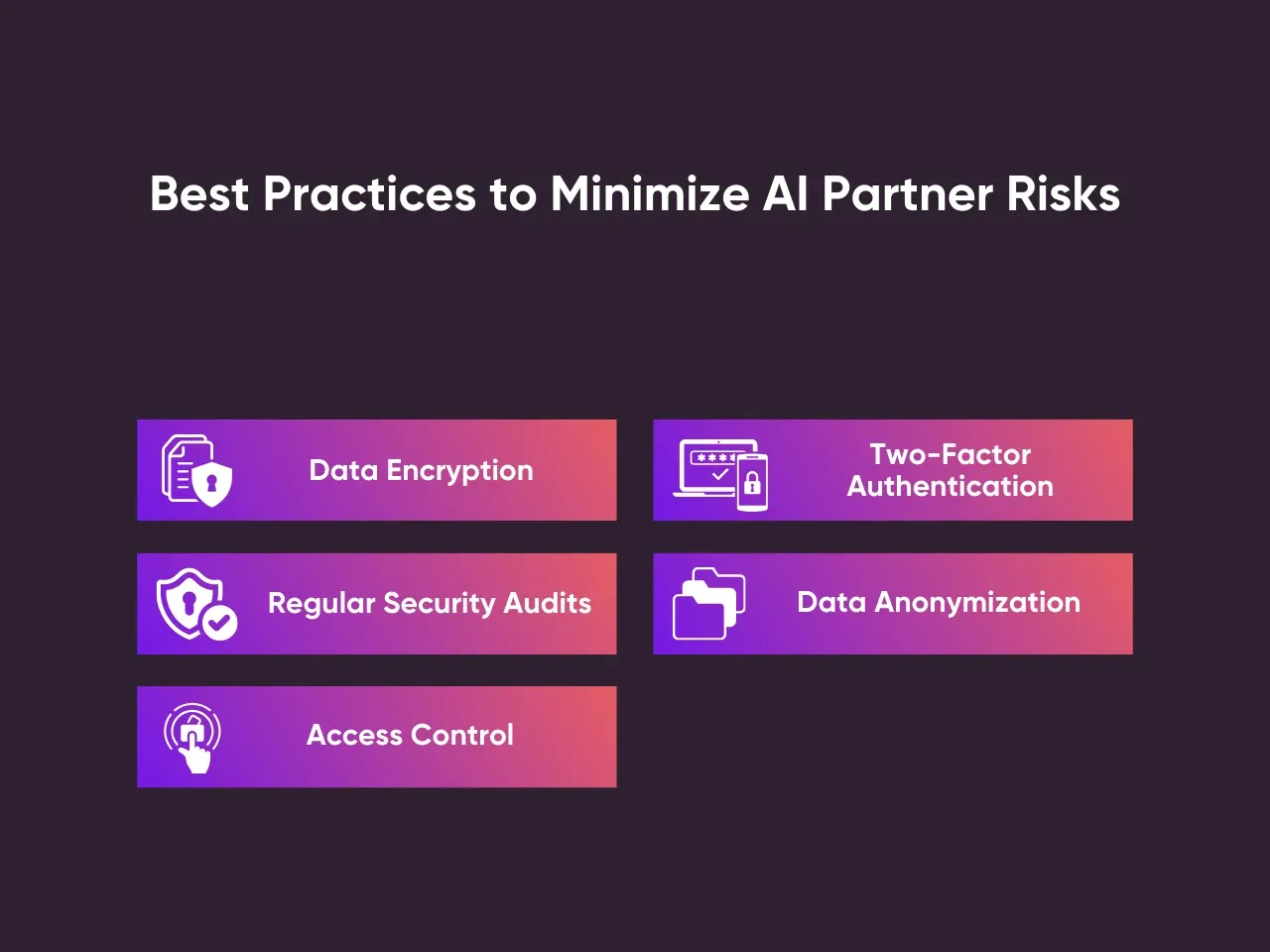
- Data Encryption: Encrypt all sensitive data before storage or transmission to prevent unauthorized access.
- Regular Security Audits: Conduct periodic security reviews to identify AI system vulnerabilities and improve defenses.
- Access Control: Limit who can access the AI’s data, ensuring only authorized personnel handle sensitive information.
- Two-Factor Authentication (2FA): Implement 2FA to add an extra layer of security, reducing the chances of unauthorized access.
- Data Anonymization: Anonymize user data wherever possible so the data remains untraceable even if a breach occurs.
Privacy and data security are critical when you build your own AI. Understanding the risks and implementing proper security measures can safeguard sensitive information and protect users from potential data misuse. Taking these precautions ensures a more secure AI experience for everyone involved.
Risk 4: Ethical Considerations
When you build your own AI, it's crucial to consider the ethical challenges involved, as the consequences can have far-reaching effects. Every AI system, especially those designed to interact with humans, carries a set of responsibilities for the creator. As you build your own AI, it's essential to consider the long-term impact of your choices.
Addressing the ethical implications of creating an AI companion includes consent, autonomy, and moral responsibilities. When you build your own AI, these factors become even more significant, shaping how the AI interacts with others and the world around it. Here are the key ethical concerns to consider:
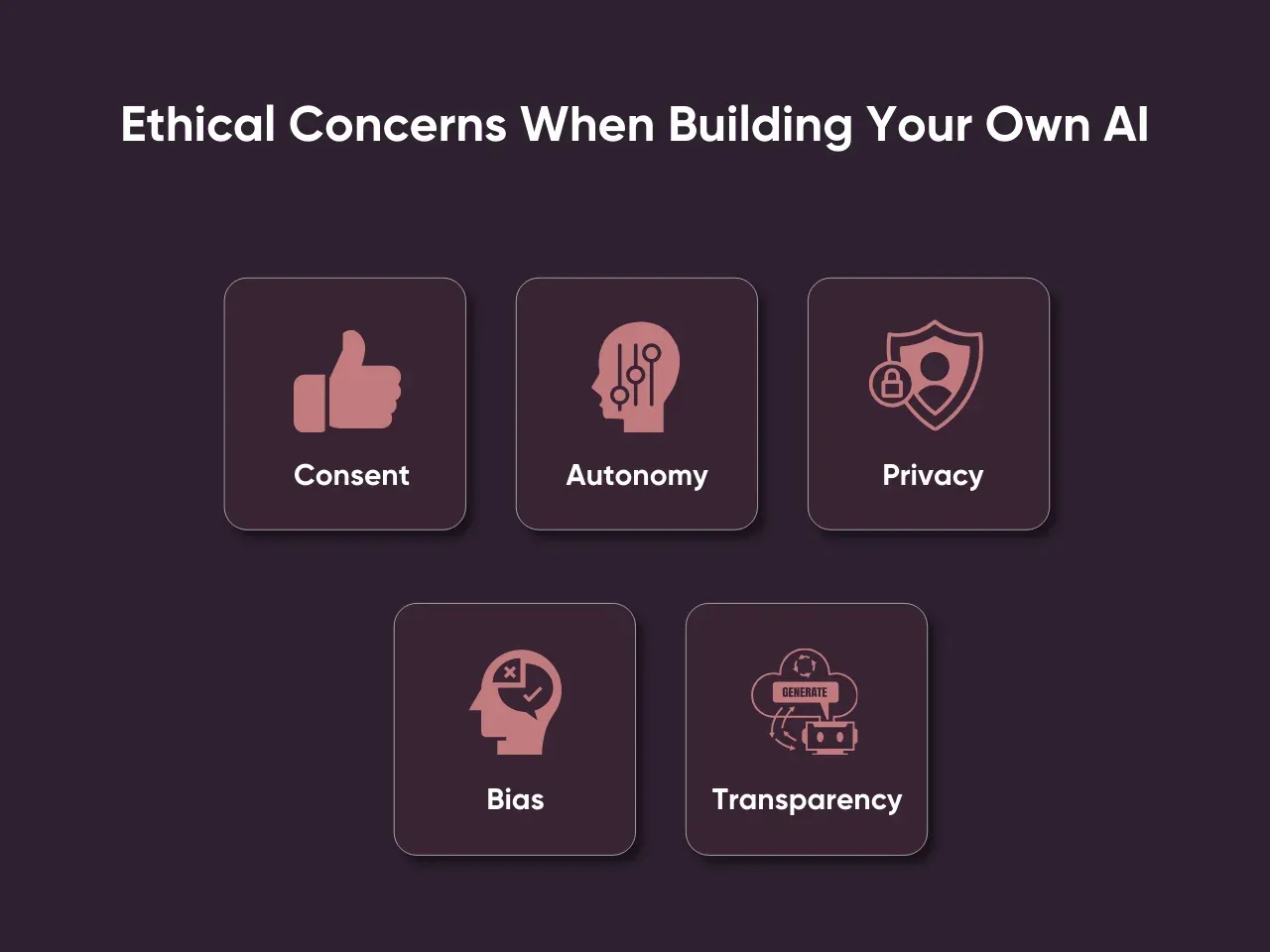
- Consent: When building your AI, ensure it understands and respects human consent. This means developing features that allow users to set clear boundaries.
- Autonomy: Your AI should respect autonomy and make decisions based on the user's preferences without violating their independence.
- Privacy: You must design the AI to protect personal information, ensuring privacy at all times.
- Bias: As you build your own AI, work to eliminate bias so the AI treats all users fairly and without discrimination.
- Transparency: It’s essential to be transparent about how your AI operates so users understand its capabilities and limitations.
Considering these ethical factors helps ensure your AI contributes positively to society. The creator is responsible for ensuring the AI is designed thoughtfully, considering how its actions will influence its surroundings.
Risk 5: Over-Reliance on AI for Emotional Support
One significant risk when you build your own AI is becoming overly reliant on it for emotional support. Users may develop strong connections with their AI companions, relying on them for comfort and validation. This can lead to the neglect of real-life relationships and the loss of critical coping mechanisms.
Human interactions offer a depth of connection that AI, no matter how advanced, cannot fully replicate. While building your AI can be exciting, it’s crucial to maintain a healthy balance between AI interaction and real-life human connections. Consider these key questions when assessing your reliance on an AI companion:
- How Often Do You Interact With Your AI Compared to Real People? Balancing your time with both ensures that AI is not your sole source of emotional support.
- Do You Turn to AI More Than Friends or Family for Comfort? If AI is your primary support, it may be time to reevaluate your relationships.
- Are You Avoiding Difficult Emotions Through AI Interactions? AI should not replace needing personal growth or facing challenging emotions.
- Is AI Companionship Limiting Your Social Activities? Ensure that engaging with AI doesn’t limit your participation in social events.
- Are You Maintaining Other Healthy Coping Mechanisms? AI should complement, not replace, positive coping strategies like journaling or exercise.
As you build your own AI, reflect on how it fits into your emotional life. While AI can be helpful, it should not replace the richness of human relationships. Striking the right balance ensures that you continue to grow emotionally while benefiting from your AI companion’s support.
Risk 6: Impact on Social Skills and Real-World Relationships
When you choose to build your own AI companion, there is a potential risk of affecting your social skills and real-world relationships. Relying heavily on AI can reduce human interaction frequency, weakening essential communication abilities. While AI provides companionship, it cannot match the depth of face-to-face conversations or emotional exchanges in real-life relationships.
Here are ways building your own AI could negatively impact social skills and relationships:
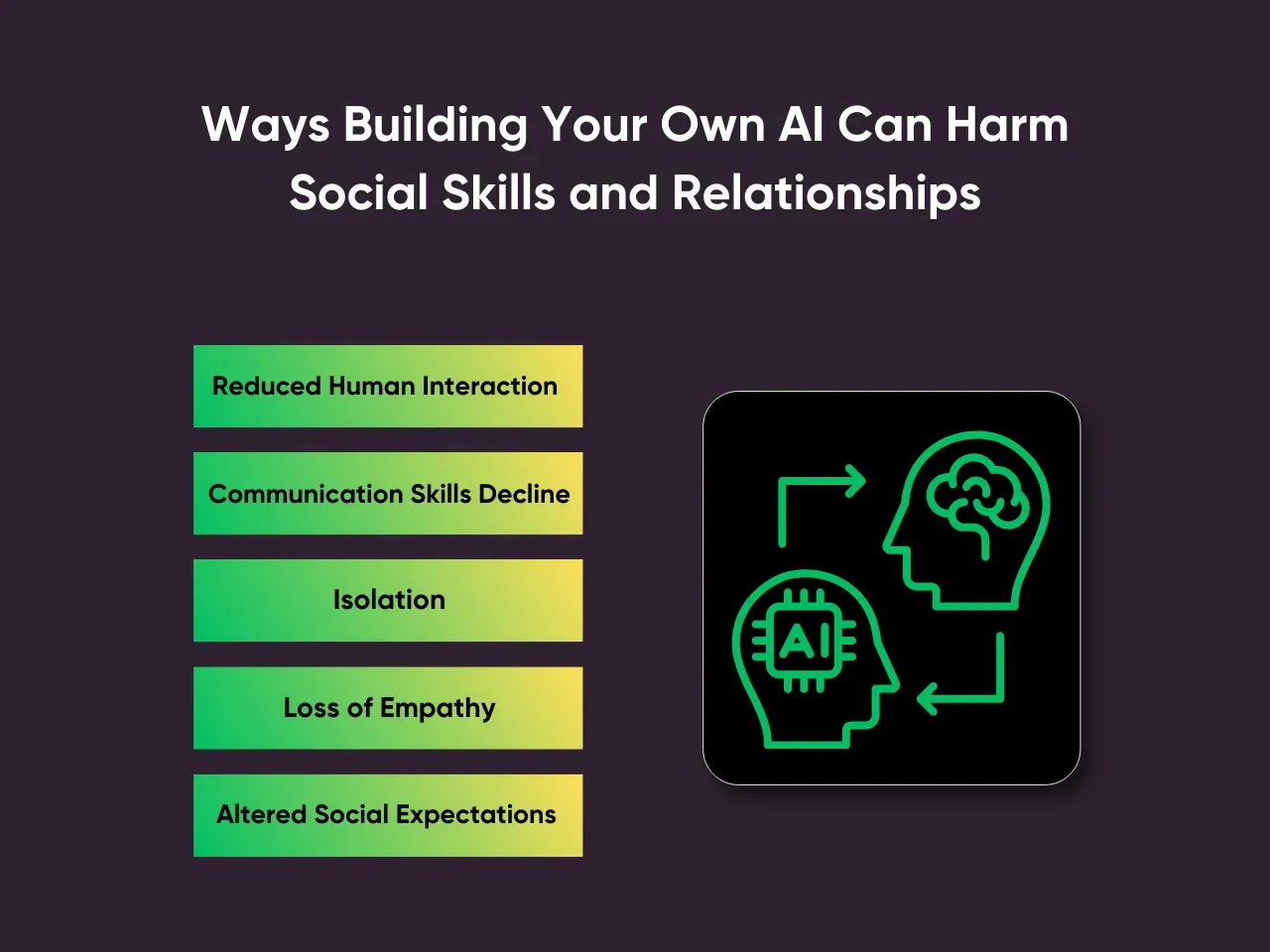
- Reduced Human Interaction: Increased use of AI companions may lead to fewer opportunities to engage with friends, family, and colleagues, limiting emotional bonding.
- Communication Skills Decline: Relying on an AI to fulfill conversational needs may result in a decline in verbal and non-verbal communication skills, such as reading body language.
- Isolation: Continuous use of an AI companion could foster feelings of isolation as the person becomes more comfortable in virtual interactions and less likely to seek out human contact.
- Loss of Empathy: Human relationships often require empathy, understanding, and emotional sensitivity. AI companions, though functional, cannot fully nurture these critical human qualities.
- Altered Social Expectations: Users may develop unrealistic expectations of human relationships based on their AI interactions, potentially causing frustration with the imperfections of real-world connections.
When you build your own AI, it's essential to balance enjoying its benefits and actively engaging with real-life social networks. Connecting with real people is vital for personal growth and emotional well-being. While you may build your own AI for entertainment or assistance, pay attention to nurturing real-world relationships which offer deeper emotional fulfillment and growth.
Risk 7: AI Bias and Limitations
When you build your own AI, it’s essential to understand that AI systems can inherit biases from their training data. Since AI learns from large datasets, any biases within that data can influence the AI’s responses. For example, if the training data contains biased language or perspectives, the AI might offer skewed outputs, potentially leading to unfair or inaccurate conclusions.
To mitigate bias when you build your own AI, consider these key strategies:
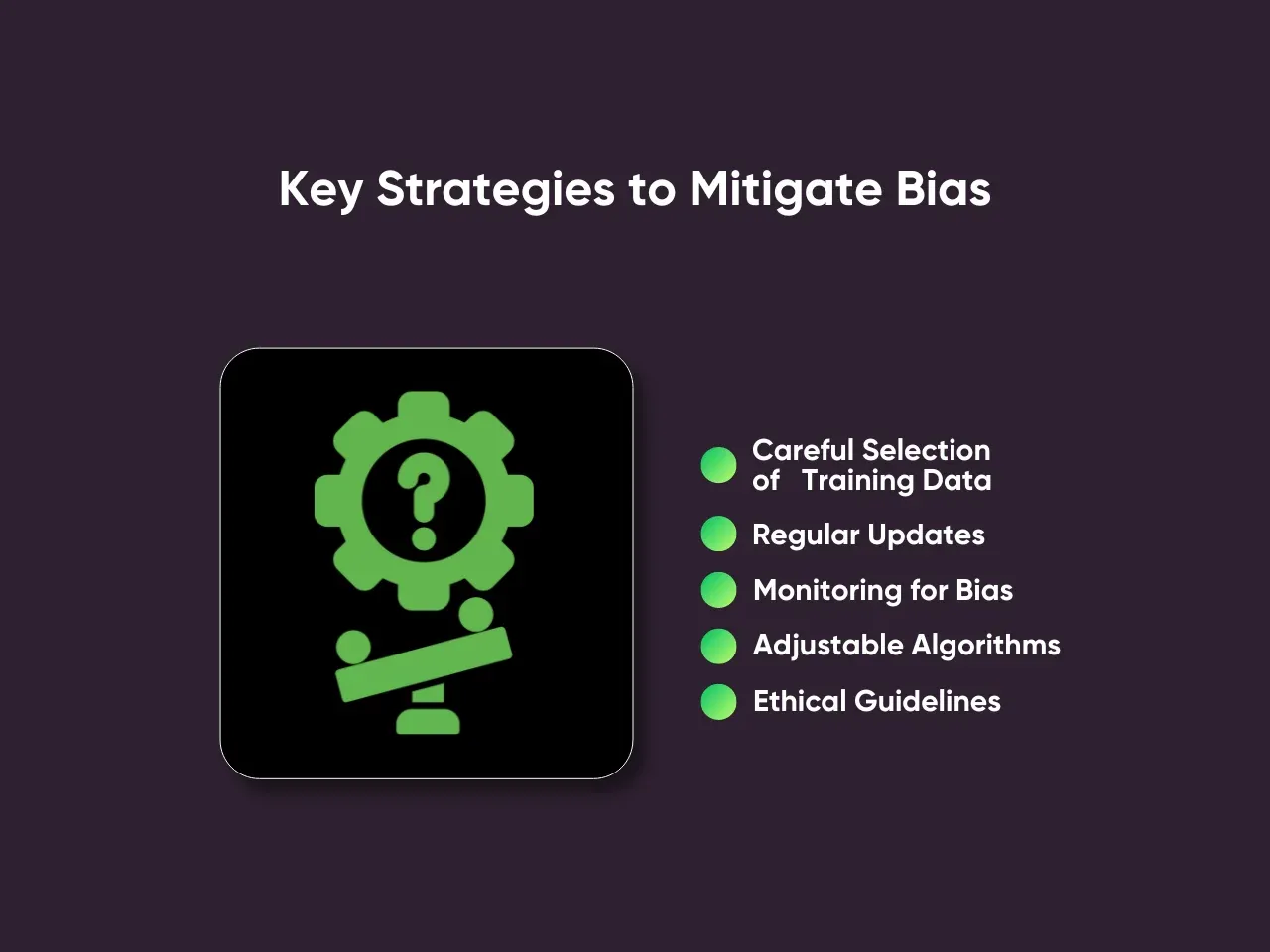
- Careful Selection of Training Data: Ensure the data used to train the AI is diverse, inclusive, and representative of various viewpoints. This reduces the risk of reinforcing existing biases.
- Regular Updates: Periodically update the AI’s learning model with fresh data to keep it relevant and reduce bias that may arise from outdated information.
- Monitoring for Bias: Monitor AI outputs to identify and address biased responses. User feedback can also help recognize patterns of bias.
- Adjustable Algorithms: Implement flexible algorithms that allow adjustments to the AI’s behavior, ensuring it aligns more closely with user expectations.
- Ethical Guidelines: Follow ethical guidelines in AI development to ensure fairness, transparency, and accountability in the system's operation.
While AI bias and limitations are inherent risks when you build your own AI, proactive steps like selecting high-quality training data and updating the model regularly can greatly minimize these challenges. This approach helps ensure the AI remains fair, responsive, and aligned with user needs.
Key Takeaway
When you build your own AI, it’s crucial to consider potential risks like privacy concerns, ethical implications, and emotional dependency. Always think about the long-term impact on personal relationships and well-being. Make sure your AI companion aligns with your needs while avoiding unrealistic expectations.
Understanding these risks will help you create the best AI companion app tailored to your needs. Whether training AI chatbots or building an unfiltered AI chat, being mindful of AI biases ensures more reliable results. Consider the risks of using AI, such as possible data breaches or reliance on flawed information, as you build your own AI.
Do you want to create the best AI companion app with minimized risks? At Kindroid, we help you build your own AI with personalized guidance. Our expertise allows you to create a safe, efficient, and ethical AI companion. Reach out today, and we’ll ensure your journey is smooth and informed.
